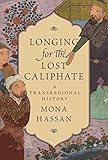Longing for the lost caliphate : a transregional history / Mona Hassan.
Material type: TextPublisher: Princeton : Princeton University Press, [2016]Description: xv, 390 pages : illustrations, maps ; 24 cmContent type: text Media type: unmediated Carrier type: volumeISBN: 9780691166780; 0691166781Subject(s): Caliphate -- History | Islam and state | Caliphate | Islam and state | Abschaffung | Intellektueller | Islam | Jurist | Kalifat | RezeptionGenre/Form: History.DDC classification: 297.6/1 LOC classification: BP166.9 | .H37 2016
TextPublisher: Princeton : Princeton University Press, [2016]Description: xv, 390 pages : illustrations, maps ; 24 cmContent type: text Media type: unmediated Carrier type: volumeISBN: 9780691166780; 0691166781Subject(s): Caliphate -- History | Islam and state | Caliphate | Islam and state | Abschaffung | Intellektueller | Islam | Jurist | Kalifat | RezeptionGenre/Form: History.DDC classification: 297.6/1 LOC classification: BP166.9 | .H37 2016| Item type | Current library | Call number | Copy number | Status | Notes | Date due | Barcode |
|---|---|---|---|---|---|---|---|
 Books
Books
|
Female Library | BP166.9 .H37 2016 (Browse shelf (Opens below)) | 1 | Available | STACKS | 51952000229360 | |
 Books
Books
|
Main Library | BP166.9 .H37 2016 (Browse shelf (Opens below)) | 1 | Available | STACKS | 51952000229353 |
Browsing Main Library shelves Close shelf browser
| No cover image available |

|
No cover image available |

|
No cover image available |

|
No cover image available | ||
| BP166.2 Z54 1989 كتاب التوحيد / | BP166.4.M328 2009 أطلس تاريخ الأنبياء والرسل / | BP166.73.O55 2011 V.1 الروح عند أهل السنة والجماعة/ | BP166.9 .H37 2016 Longing for the lost caliphate : a transregional history / | BP166073.O55 2011 V.1 موسوعة الروح | BP170.D5212 2009 الاختيار بين الإسلام والنصرانية / | BP170.H6413 2002 الإسلام كبديل / |
Includes bibliographical references and index.
Introduction -- 1. Visions of a lost caliphal capital: Baghdad, 1258 C.E. -- 2. Recapturing lost glory and legitimacy -- 3. Conceptualizing the caliphate, 632 -- 1517 C.E. -- 4. Manifold meanings of loss: Ottoman defeat, early 1920s -- 5. In international pursuit of a caliphate -- 6. Debating a modern caliphate -- Notes -- Bibliography -- Index -- Illustrations and maps.
A global history, Longing for the Lost Caliphate delves into why the caliphate has been so important to Muslims in vastly different eras and places. This book explores the myriad meanings of the caliphate for Muslims around the world through the analytical lens of two key moments of loss in the thirteenth and twentieth centuries. Through extensive primary-source research, Mona Hassan explores the rich constellation of interpretations created by religious scholars, historians, musicians, statesmen, poets, and intellectuals. Hassan fills a scholarly gap regarding Muslim reactions to the destruction of the Abbasid caliphate in Baghdad in 1258 and challenges the notion that the Mongol onslaught signaled an end to the critical engagement of Muslim jurists and intellectuals with the idea of an Islamic caliphate. She also situates Muslim responses to the dramatic abolition of the Ottoman caliphate in 1924 as part of a longer trajectory of transregional cultural memory, revealing commonalities and differences in how modern Muslims have creatively interpreted and reinterpreted their heritage. Hassan examines how poignant memories of the lost caliphate have been evoked in Muslim culture, law, and politics, similar to the losses and repercussions experienced by other religious communities, including the destruction of the Second Temple for Jews and the fall of Rome for Christians. -- Adapted from the dust jacket Provided by publisher.
1 2

There are no comments on this title.